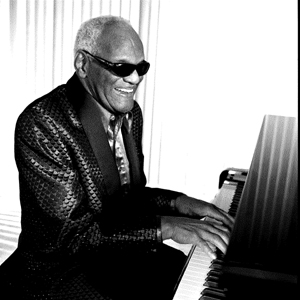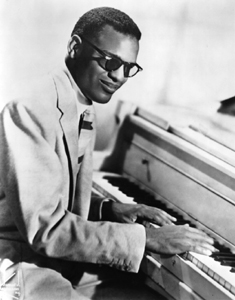![[Metroactive Music]](/gifs/music468.gif)
[ Music Index | Santa Cruz | Metroactive Home | Archives ]
Aptos Village Park becomes the Valley of the Giants May 24 and 25 when the Santa Cruz Blues Festival brings towering musical legend Ray Charles to its Saturday stage
By Rob Pratt
That Ray Charles has earned a place among the top rank of musical performers stands without dispute. Over the course of a career that spans more than 50 years, he has sent songs up to the top of the pop charts and won a dozen Grammy Awards. But he holds a much higher place among the deities of American popular music than that of a singing sensation.
Consider a single recording date: New York in 1959. Charles joins longtime friend and big band arranger Quincy Jones in the studio to record tracks for The Genius of Ray Charles, a collection of big band and orchestral settings of Charles originals and jazz standards. Arrayed before them are members of Duke Ellington and Count Basie's band--tenor men Paul Gonsalves and David "Fathead" Newman among them. In the booth, Phil Ramone sits behind the mixing console with record executive Jerry Wexler. Before things get rolling, they check out a new invention in sound engineering: stereo. This single moment from Charles' lengthy career brought together performers and promoters pivotal during the first half of the 20th century with recording artists and technicians who would become seminal figures during the decades to come.
Charles reached the pinnacle of his recording career during this period--if any period could be called the peak among a career that looks more like a continuous slope of ascension than a curve of peaks and valleys. By 1962, he had recorded his biggest hits, "Georgia on My Mind" and "Hit the Road, Jack." He also made an incredible foray into big band jazz on 1961's Genius + Soul = Jazz and an unexpected and acclaimed excursion across the racial divide in popular music with 1962's Modern Sounds in Country and Western Music. These are the sounds that are instantly recognizable as Ray Charles--highly sophisticated arrangements of bluesy originals overlaid with gritty vocals and funked up with gospel-tinged piano or organ chording.
Ex-Ray Specs: The Santa Cruz Blues Festival's Saturday roster.
Lovin' Bloomfield: Chris Cain and his brother Patrick's band--The Ford Blues Band--pay tribute to the late Michael Bloomfield.
Sunday School: The Santa Cruz Blues Festival's Sunday roster.
Grit and Polish
He sings like a man trapped between the bliss of heavenly peace and the crushing toil of an earthly existence. He manages to sound simultaneously like a preacher offering salvation and a favored uncle passing along wisdom earned during a lifetime of tussling with the evils of the world. And to hear Charles tell it, it's second nature.
"As long as I can remember, music has always been something extraordinary in my life. ... My first love was the music I heard in the community: blues, church gospel music and country and western," Charles writes in his autobiography.
From the time he entered his teens, Charles' innate musical talent was obvious. But from the earliest days of his career, he has also shown a master craftsman's precision and a promoter's grand vision. In an interview with National Public Radio's Terri Gross, Quincy Jones tells of the early years working with a 16-year-old Charles--Jones was 14 at the time--among the clubs of Seattle, Wash.
"I think it was at the Elks Club where we used to play two jobs and at the white tennis clubs where we'd play the popular music of the day," Jones says. "Then at 10 o'clock we'd go play the black clubs ... As kids we were pretty cocky because we had a great band and we could read music very well, and we did everything. We played with Billie Holliday in '48 and in '49 we played with Billy Eckstein and Cab Calloway and all the bands that came through. So we were pretty confident in those days.
"[Charles] had his own apartment and two suits--it was amazing," Jones continues. "But I guess what impressed me the most with Ray is that he was so independent and his sightlessness did not really hinder him at all.
"It is really one of the cherished friendships I have had because as kids we used to talk about everything. He showed me how to write music in Braille, Dizzy Gillespie songs like 'Emanon,' and bebop, etc., and we used to dream about the future. Like, 'Wouldn't it be great to work with a symphony orchestra? One day we're going to do that. One day we're going to have three girlfriends each. One day we're going to do movies together--we're going to do all of that stuff.' And we did it--that's what's amazing," Jones says.
During that time--the late '40s to early '50s--Charles drew influence from Nat "King" Cole and Charles Brown. But only a few years later, he had turned up the heat on the cool, West Coast blues style he affected and earned a smash rhythm and blues hit with "I Got a Woman," and followed up with "Hallelujah I Love You So" and his first million-seller, "What'd I Say." With a female backup quartet singing call-and-response with his lead vocals, Charles developed a sound that fused blues, jazz and gospel into a sound that would soon become known as "soul."
The connection between jazz-blues pianist Brown and Charles is not lost on Santa Cruz Blues Festival co-founder Bill Welch. Both have topped the bill for the festival, and both remain among his favorite performers.
"I grew up in L.A., listening to Ray Charles, Charles Brown and Nat "King" Cole," Welch says. "I used to play them all the time. In fact, you couldn't go to Fatburger on La Cienega without hearing Ray Charles, Charles Brown or Nat "King" Cole on the radio."
The rather Herculean feat of bringing a legendary superstar like Charles to Santa Cruz for the Blues Festival took a lot of work--work that is suddenly paying off in an incredible way. "I started working on getting him out here three years ago maybe to do something with the symphony, so having him out here with the full band is a dream come true," Welch says. "There're not a lot of these legendary guys left ... so I'm just trying to get as many of them as we can and share them with the community."
[ Santa Cruz | Metroactive Central | Archives ]
Copyright © Metro Publishing Inc. Maintained by Boulevards New Media.
![]()

Ray Charles
![[line]](/gifs/line.gif)
![[line]](/gifs/line.gif)

Where There's a Will There's a Ray
Ray Charles performs at the Santa Cruz Blues Festival Saturday, May 24, at Aptos Village Park. Tickets are $40 general admission, $20 12-and-under, $65 Gold Circle seats. Call the Blues Hotline at 479.9814 for ticket information.
From the May 14-21, 2003 issue of Metro Santa Cruz.